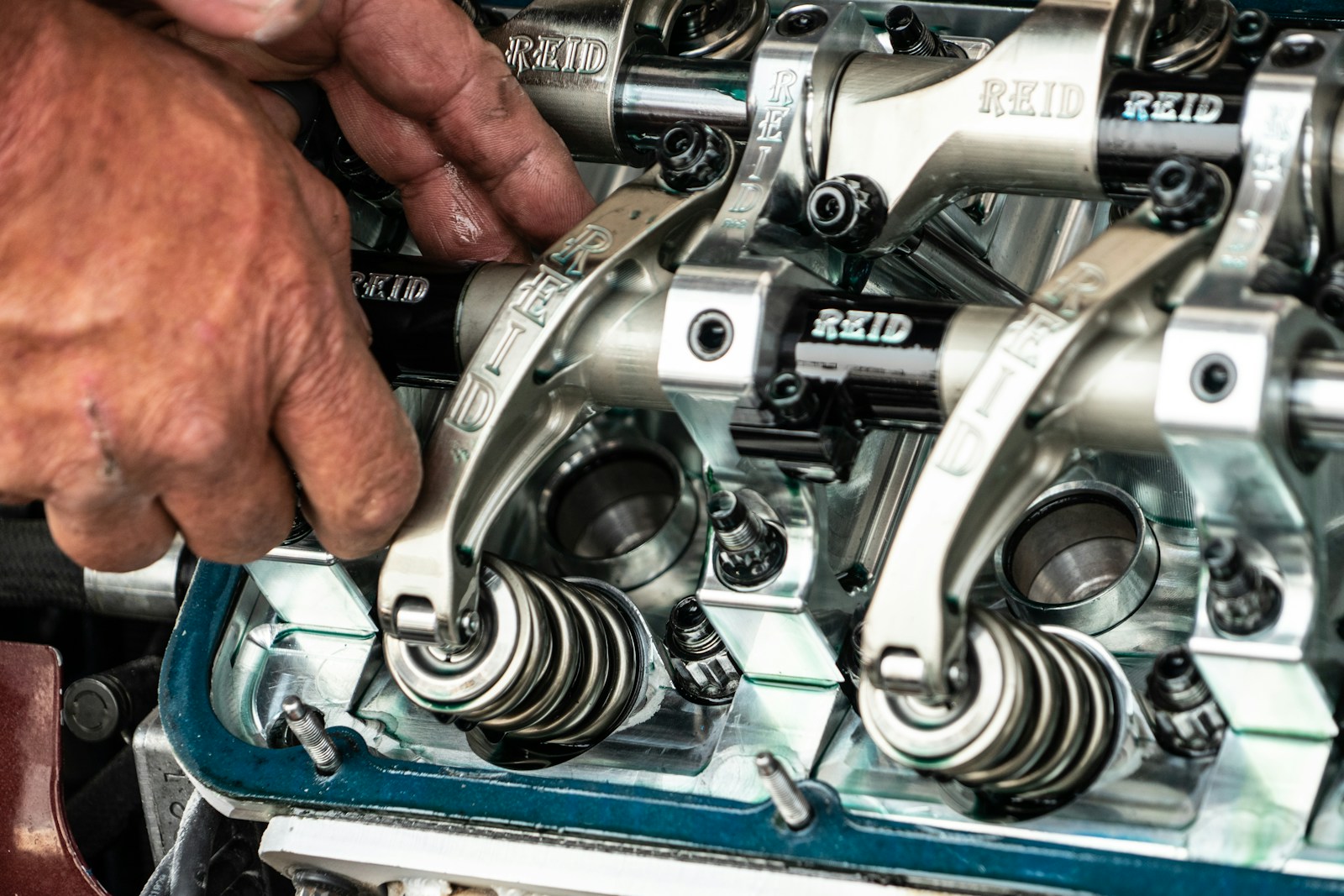Car problems can strike at any time and leave you stranded on the road. Most car breakdowns happen because owners skip basic maintenance tasks. We will show you ten simple ways to keep your car running smoothly and avoid costly repairs.
These easy tips will help your car last longer and save you money.
Regular Oil Changes
Regular oil changes keep your engine running well. Your car needs fresh oil every 3,000 to 5,000 miles to work at its best. Clean oil helps all engine parts move smoothly and stops them from wearing out fast.
Monthly oil level checks help catch problems early. A new oil filter must go in with each oil change to keep your engine clean.
Good oil care saves you money on big repairs later. Fresh oil makes your engine run better and use less gas. Your car will last longer with proper oil changes. A well-oiled engine stays safe and strong on the road.
Next, let’s talk about why good tire care matters for your car.
Ensure you change your vehicle’s oil according to the manufacturer’s recommendations or more frequently if you drive in harsh conditions.
Fresh oil keeps your car’s engine healthy and strong. Your car needs an oil change every 3,000 to 5,000 miles to run at its best. The owner’s manual lists the right time for oil changes based on your car model.
Harsh driving can make your engine work harder, so you might need more frequent oil changes. A monthly oil check helps catch problems early.
Clean oil makes your engine work better and saves gas money. Old, thick oil forces your engine to work harder than it should. Your car’s warranty stays good with proper oil changes at the right times.
A new oil filter goes in with each oil change to catch dirt and keep the engine clean. These simple steps stop big repair bills later and help your car last longer.
Maintain Tire Pressure and Tread
Good tires grip the road and keep you safe. Bad tires put lives at risk.
Tire pressure needs monthly checks to keep your car safe and save gas. Your tires should last 3 to 6 years or up to 80,000 miles with proper care. Check the tread depth with a penny or look at the wear marks on your tires.
You must rotate your tires every 5,000 to 10,000 miles to make them wear evenly.
Your tires need regular checks for bulges, cuts, and odd wear patterns. These signs tell you if your tires need fixing or replacing. Good tire care helps your car run better and keeps you safe on the road.
Stay alert for tire recalls from makers to fix any safety issues fast. Proper tire care makes your car run smoother and use less gas.
Check tire pressure monthly and keep an eye on tread wear to ensure optimal performance and safety.
Tire pressure needs monthly checks during your gas fill-ups. Your tires must have the right amount of air to keep you safe on the road. Low tire pressure can make your car use more gas and wear out faster.
A simple pressure check helps your tires last longer and keeps you safer.
Your tires need care to stay in good shape. Most tires last 3 to 6 years or up to 80,000 miles with proper care. The penny test shows if your tread depth is still safe. Your tires need to rotate every 5,000 to 10,000 miles to wear evenly.
Watch if your car pulls to one side while driving, as this means you need a wheel alignment.
Check and Replace Your Brakes
Brake safety needs your full attention every six months. Your brake pads must stay in top shape to keep you safe on the road. Most brake pads last between 30,000 to 100,000 miles, based on your driving style.
Strange sounds or shaking from your brakes mean you need help right away. Smart drivers check their brakes during each tire rotation to catch problems early.
Regular brake system checks save you money and prevent big repairs later. Your brake fluid levels play a big part in how well your brakes work. People who drive long trips or stop often need more brake checks than others.
Good brake maintenance includes checking pads, rotors, and fluid levels. Next, let’s look at how to keep your car’s fluid levels in check to avoid problems down the road.
Regularly inspect brake pads and discs for wear and replace them as needed to maintain braking efficiency.
Your car’s brakes need regular checks to keep you safe on the road. Smart drivers check their brakes every six months during tire rotations. Good brake pads can last between 30,000 to 100,000 miles based on how you drive and what they’re made of.
Listen for signs that tell you it’s time to replace your brakes. Strange sounds like squeaking or grinding mean you should get them checked right away. Your brake fluid needs a change every two years or 24,000 miles to work well.
Fresh brake fluid helps your car stop better and keeps you safer on the road.
Inspect and Maintain Fluid Levels
Just like brake maintenance, fluid levels need regular checks to keep your car running well. Your car needs six main fluids to work right. These fluids include motor oil, transmission fluid, brake fluid, coolant, and power steering fluid.
Each fluid plays a big role in how your car runs.
Clean fluids at the right levels help stop damage to your car’s parts. A quick check each month can find leaks early. Take your car to a mechanic for deep checks of all fluids. They can spot small problems before they turn into big, costly fixes.
Dirty or low fluids can hurt your car’s parts and make it less safe to drive.
Regularly check fluid levels including coolant, brake fluid, and transmission fluid, and top them up or change them as necessary.
Your car needs different fluids to run well. Check all fluid levels once a month to keep your car safe. Look at the brake fluid, coolant, and transmission fluid levels. These fluids help your car move and stop the right way.
Top up each fluid if it gets too low. Clean fluids make your engine work better.
Each fluid has a special job in your car. Power steering fluid helps you turn the wheel easily. Windshield washer fluid keeps your view clear while driving. Coolant stops your engine from getting too hot.
Fresh brake fluid makes sure you can stop safely. Your car manual will tell you how often to change each fluid. Regular checks will save you money on repairs later.
Replace Windshield Wipers
Clear vision during bad weather starts with good windshield wipers. You must replace your wipers twice each year, once in spring and once in fall. Worn wipers leave streaks on your windshield and make it hard to see the road.
Bad weather can make wipers wear out faster, so check them often for signs of damage.
Proper wiper size matters for safe driving in rain and snow. Check your car’s manual to find the right size for both front and back wipers. New wipers help keep you safe on wet roads and make your car last longer.
Replace them as soon as you notice streaking or squeaking sounds during use.
Change your windshield wipers at least once a year to ensure clear visibility during rain and snow.
Your windshield wipers need regular replacement to keep you safe on the road. Most car experts say you should put new wipers on your car every 6 to 12 months. Bad weather makes wipers wear out faster.
The rubber parts can crack and split in hot, dry weather too.
Fresh wipers help you see better in rain and snow. They clean your windshield without leaving streaks or spots. Bad wipers can make driving unsafe because they don’t clear water well.
Spring and fall are perfect times to check your wipers and put on new ones if needed.
Test and Change the Battery
A car battery needs regular checks to keep running well. Most batteries last 3 to 5 years, but good care can make them work for up to 10 years. Battery testing should happen once a year and before long trips.
The voltage must stay above 12.4 volts for the best results.
Clean batteries work better than dirty ones. Check the battery terminals often for any green or white stuff. This can stop power from flowing right. A pro can test the electrical system and tell if the battery needs to be changed.
Quick battery checks stop cars from breaking down on the road.
Check your car’s battery and replace it every 3-5 years or as performance decreases.
Your car battery needs regular checks to keep running well. Test it once a year and before long trips to avoid sudden failures. Most car batteries last between 3 to 5 years, with new ones costing $100 to $500.
Check your battery’s voltage with a multimeter for the best results. Good batteries show more than 12.4 volts. Clean the battery and its tray often to stop dirt from building up. This simple step helps your car start better and keeps the electrical system working right.
Check and Replace Lights
Broken car lights create big safety risks on the road. All drivers must check their headlights and taillights often to stay safe. Bad lights can lead to traffic tickets and costly fines.
A quick daily check of all car lights helps spot burnt-out bulbs fast.
Auto mechanics can fix light problems and replace old bulbs right away. Regular light checks keep you safe and legal on the road. Bright, working lights help other drivers see you at night and in bad weather.
Smart drivers fix broken lights fast to avoid tickets and crashes.
Ensure all headlights, taillights, and indicator lights are functioning correctly and replace any burnt-out bulbs.
Your car’s lights play a vital role in safe driving. Regular checks of all vehicle lights help prevent accidents and tickets. You must inspect your headlights, taillights, and license plate lights often.
A quick walk around your car can spot any problems right away.
Bad lights create safety risks on the road. Replace burnt bulbs as soon as you notice them. Your car needs working front and rear lights to stay legal. Good lights let other drivers see you at night and in bad weather.
Make sure turn signals flash clearly to show your driving plans. A simple light check takes just a few minutes but keeps you safe on every trip.
Replace the Engine Air Filter
A clean engine air filter helps your car run better. The filter sits in a plastic box under your hood and keeps dirt away from the engine. Most car makers say you need to change it every 12,000 to 15,000 miles.
A gray or clogged filter hurts how well your engine works. Regular checks of this part make your car more reliable and save gas.
The cabin air filter also needs care once a year. This filter keeps bad smells out of your car and helps air flow better through your vents. Changing both filters makes your car run great and last longer.
Next, let’s look at why checking belts and hoses matters for your car.
Keep your engine running efficiently by changing the air filter every 12,000 to 15,000 miles or as advised by your vehicle’s manufacturer.
Your car needs a clean air filter to run well. Engine air filters must be changed every 12,000 to 15,000 miles or once per year. This simple task helps your car use less gas and run better.
Bad air filters can make your engine run poorly and waste fuel. Your car might also make strange noises if the filter is dirty.
Regular checks of your cabin air filter matter too. Check this filter once a year or if you notice less air coming from your vents. Fresh filters keep the right amount of air flowing to your engine.
This helps your car stay strong and saves you money on gas. Dirty filters can hurt your car’s power and make it work harder than it needs to.
Monitor and Maintain Belts and Hoses
Belts and hoses play vital roles in keeping your car safe and running well. These parts control major systems like your radiator and air conditioning. DeBroux Automotive experts suggest checking belts and hoses each time you get an oil change.
This helps catch problems early before they cause big repairs.
Frayed belts or cracked hoses need quick replacement to avoid sudden breakdowns. Regular checks of these parts make your car more reliable and safe. Smart car owners watch for signs of wear during basic maintenance tasks.
A well-maintained set of belts and hoses helps your engine run at its best. Next, let’s look at why keeping your car clean matters for its long-term care.
Inspect belts and hoses for signs of wear and replace them to prevent breakdowns and expensive repairs.
Your car’s belts and hoses need regular checks to stay safe on the road. Smart drivers check these parts during each oil change to spot any problems early. You should look for cracks, fraying, or leaks in all belts and hoses.
Quick fixes now can save you from big engine troubles later. Bad belts or hoses can cause your engine to fail and cost lots of money to fix. Regular checks help you catch small issues before they turn into major problems.
Replace any worn parts right away to keep your car running well.
Keep Your Car Clean
Regular car cleaning helps protect your car’s value and life. Mud, salt, and road dirt can harm your car’s paint and parts under the car. A clean car needs proper washing and waxing to stop rust from forming.
The outside wash must include the car’s bottom to remove harmful stuff that sticks there.
Inside cleaning matters just as much as outside care. Dirt builds up fast in cars that get lots of use. Quick vacuuming stops bad smells and keeps seats looking nice. Cars need more frequent cleaning if they face tough weather or daily use.
Clean cars last longer and stay worth more money over time.
Regularly washing and detailing your car not only keeps it looking good but also prevents long-term damage from dirt and debris.
A clean car stays in better shape longer. Your car needs a good wash and wax once a year to keep the paint safe. Dirt and salt can eat away at your car’s paint and metal parts if left alone.
Car detailing goes beyond simple washing to protect your investment. The inside of your car needs care too. You must vacuum the carpets and clean all seats often. This stops bad smells and keeps the inside looking nice.
Cars that drive a lot need more cleaning than others. Mud, road salt, and tree sap can stick to your car’s paint. These things can cause rust and other damage over time. Auto detailing helps catch small problems before they get big.
A clean car also sells for more money later. The next step is to check your car’s battery to make sure it works well.
Bottom line
Consistent maintenance is key to ensuring your car remains reliable and efficient. Follow these tips to keep your vehicle in excellent condition.
Regular car care keeps your vehicle safe and reliable. Smart maintenance helps you spot small issues before they turn into big problems. Your car needs basic care like oil changes and tire checks to run well.
These simple steps save you money and prevent costly repairs.
Good maintenance makes your car last longer and run better. Safe driving starts with checking brakes and tires often. Fresh oil and clean fluids help your engine work its best. Your car stays strong with basic care, and you avoid big repair bills later.
Taking care of your car today means fewer problems tomorrow.
For more tips and insights on vehicles, check out our article on the 10 fastest cars under $50,000.




